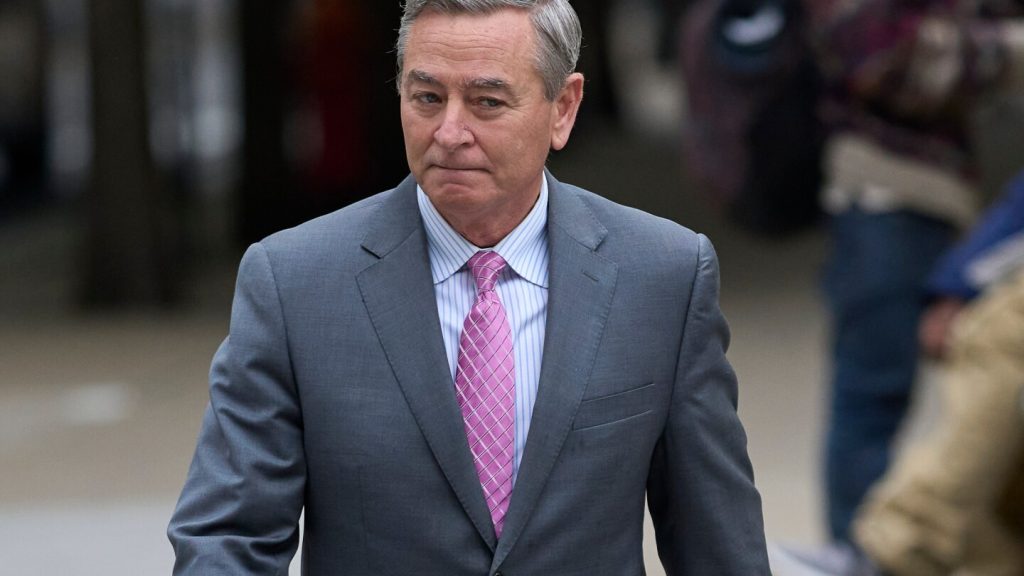Listen to the article
President Trump Pardons Former Tennessee House Speaker in Corruption Case
President Donald Trump has issued pardons to former Tennessee House Speaker Glen Casada and his ex-chief of staff, Cade Cothren, who were convicted on public corruption charges. The White House justified the pardons by claiming the Biden administration’s Justice Department had “significantly over-prosecuted” the pair for what it characterized as a “minor issue.”
Casada, a Republican state representative, was sentenced to three years in prison last September, while Cothren received a 2.5-year sentence. Their convictions stemmed from a fraudulent scheme where they created a fake company to secure taxpayer-funded mail business from state lawmakers after both had been forced from their leadership positions.
The scheme centered around Phoenix Solutions, a company Cothren established with Casada’s knowledge and support, according to prosecutors. They fabricated a nonexistent owner named “Matthew Phoenix” to conceal Cothren’s involvement. Through this deception, the companies controlled by Casada and another lawmaker, Robin Smith, received approximately $52,000 in taxpayer money in 2020 through a legislative mailer program.
Court documents revealed elaborate efforts to maintain the ruse, including Casada’s then-girlfriend posing as an associate of the fictitious Matthew Phoenix and a forged signature appearing on IRS tax documents.
The corruption case followed a series of scandals that had already damaged both men’s careers. Casada resigned as House speaker in 2019 after losing a no-confidence vote from fellow Republicans following revelations that he had exchanged sexually explicit text messages about women with Cothren years earlier. Cothren had previously stepped down from his position over those same texts, racist messages, and his admission to using cocaine inside a legislative building during a previous job.
A White House official, speaking on background, defended the pardons by claiming the scheme resulted in a net profit loss of less than $5,000 and was billed at competitive prices. The official also criticized what they described as disproportionate prosecution tactics, including an armed raid and “perp walk,” arguing such measures would be more appropriate for multi-million-dollar fraud cases.
These pardons continue a pattern established during Trump’s presidency of granting clemency to political allies and public figures convicted of defrauding the public. Earlier in his term, Trump pardoned former Illinois Governor Rod Blagojevich, a Democrat, and Republican former Connecticut Governor John Rowland, both of whom were convicted on corruption charges.
The president has also extended pardons to former New York Republican Congressman Michael Grimm, who resigned from Congress after a tax fraud conviction and once threatened to throw a reporter off a Capitol balcony. Additionally, reality TV stars Todd and Julie Chrisley received pardons after being convicted of bank fraud and tax evasion.
Trump’s administration has simultaneously taken steps to weaken public integrity safeguards, including firing the Justice Department’s pardon attorney and substantially diminishing the prosecution unit created to hold public officials accountable for abusing the public trust.
These actions have raised concerns about the administration’s approach to public corruption cases and the message being sent about accountability for elected officials. Critics view the pardons as undermining the justice system’s role in addressing misconduct by public servants, while supporters argue they correct perceived prosecutorial overreach from previous administrations.
As the administration continues to issue controversial pardons, questions persist about the criteria being used to determine which convictions merit clemency and the implications for future public corruption prosecutions.
Fact Checker
Verify the accuracy of this article using The Disinformation Commission analysis and real-time sources.




10 Comments
I’m curious to learn more about the Biden administration’s role in this case. Were there valid grounds to re-examine the prosecution, or is this simply a partisan move by Trump to undermine his successor?
That’s a good question. More transparency is needed to understand the motivations behind this pardon and whether it was appropriately justified.
While I appreciate the desire for leniency, the details of this case suggest a clear abuse of power. Taxpayer funds were misused for personal gain – that’s a serious violation of the public trust that shouldn’t be brushed aside.
Exactly. This pardon undermines the rule of law and accountability for public officials. It’s a troubling development that warrants close scrutiny.
While I understand the desire for leniency, the details of this case suggest a clear abuse of power. Taxpayer funds were misused for personal gain – that’s a serious violation of the public trust.
Exactly. These types of crimes should not be trivialized, regardless of political affiliation. The integrity of our government is at stake.
This sets a dangerous precedent of politicians using their pardon power to protect their allies from the consequences of corruption. It’s deeply concerning and erodes public faith in the system.
I agree. Pardons should be reserved for cases with clear mitigating factors, not used as a political tool to shield allies from accountability.
This pardon seems highly questionable. Corruption in government should be taken seriously, not dismissed as a ‘minor issue’. Trump’s actions undermine the rule of law and accountability for public officials.
I agree, this sets a troubling precedent. Pardoning those convicted of public corruption erodes trust in our democratic institutions.